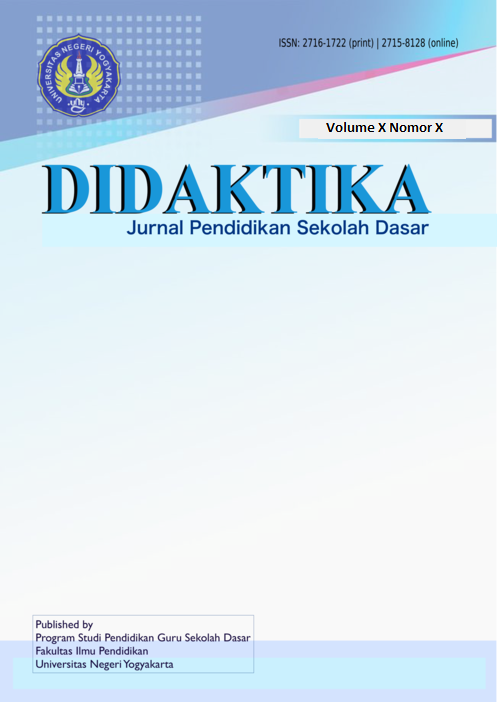Peningkatan Hasil Belajar Siswa pada Materi Energi Gerakan melalui Model Contextual Teaching and Learning (CTL) pada Siswa Sekolah Dasar
DOI:
https://doi.org/10.21831/didaktika.v2i2.28099Abstract
This study aims to improve the result study of sains through CTL. This research is a Classroom Action Research. The subject of the research is the 3th grade student at Ngabenrejo 3 Elementery School. The research instruments are observation sheets, pretest and postest. Data analysis was done by descriptive statistc technique by determining mean, median, mode, lowest score, highest score, and completeness of study individually or classically presented in percentage form. The result of this research shows that CTL can increase the result study of sains of the 3th grade student. This can be seen from the increase of the pra cycle stage which shows the result study of sains of the students by 40, 09 % with the average score is 57, 04 has increase in the first cycle of 68, 18 % with the average score is 70 and the second cycle there is also a significant increase of 95, 45 % with the average score is 85, 68. This means that the implementation of class action research is successful. Based on the result of the research, the implications that can be given, among others, is this study provides an overview of the improvement of the result study of student after applying the CTL. This learning provides students the opportunity to learn independently and improve their creativity
References
Aunurrahman. (2012). Belajar dan Pembelajaran. Bandung: Alfabeta.
Dasari. (2002). Strategi Belajar Mengajar. Jakarta: Rineka Cipta.
Hamdani, O. (2002). Perencanaan Pengajaran Berdasarkan Pendekatan Sistem. Jakarta :BumiAksara.
Hosnan.(2014).Pendekatan Saintifik dan kontekstual dalam Pembelajaran Abad 21. Bogor: Ghalia Indonesia.
IbnuBadar, T. (2014).Mendesain Model Pembelajaran Inovatif, Progresif, dan Kontekstual ,Jakarta: Prenadamedia group.
Johnson B, E. (2014). Contextual Teaching and Learning. Bandung: Kaifa.
Komalasari, K. (2010). Pembelajaran Kontekstual Konsepdan Aplikasi. Bandung: PT RefikaAditama.
Lorin, Maria. (2013). Peningkatan Aktivitas Siswa Pembelajaran Learning Menggunakan Model Contextual Teaching And Learning (CTL) Kelas IV SDN 10 Bonti. Pontianak: Universitas Tanjungpura
Marsiti. (2008). Efektivitas Penerapan Metode Contextual Teaching And Learning (CTL) dalam Meningkatkan Motivasi Belajar Siswa Kelas III SDN Wonosobo. Semarang: UNNES.
Mulyasa.(2012). Manajemen Pendidikan Karakter. Jakarta: PT BumiAksara.
_______(2016). Pengembangan Dan Implementasi Kurikulum 2013 Bandung: Remaja Rosdakarya
Nugroho, Deni. (2013). Upaya Meningkatkan Kemampuan Berkomunikasi dan Pemahaman Konsep Siswa Kelas VIIIB Smp N 3 Ngawen Pada Pembelajaran Keterampilan Elektronika Melalui Pendekatan Contextual Teaching And Learning (CTL) Tahun Pelajaran 2013/2014. Yogyakarta: UNY.
Rifai, Catharina. (2009). Psikologi Pendidikan. Semarang : UPT UNNES Press
Ridwan.(2010). Dasar-dasar Statistika. Bandung: Alfabeta.
Putra, S R. (2013). Desain Belajar Mengajar Kreatif Berbasis Sains. Yogyakarta: Diva Press.
Rustaman, dkk. (2005). Strategi Belajar Mengajar .Malang : UM Press.
Sanjaya.(2009).Penelitian Tindakan Kelas. Jakarta: Kencana Prenada Media.
Sudjana, N. (2014). Penilaian Hasil Proses Belajar Mengajar. Bandung: PT Remaja Rosdakarya.
Suryobroto.(2010). Dasar-dasar Pendidikan. Jakarta: Rhineka Cipta.
Susanto, A. (2013). Teori Belajar dan Pembelajaran di SD. Jakarta: Kencana Prenada Media Group.
Suyadi.(2010). Penelitian Tindakan Kelas.Yogyakarta: Diva Press.
Syaefudin, U. (2009). Inovasi Pendidikan.Bandung: Alfabeta.
Syah, Nuhubbin. (2010). Psikologi Pendidikan, Bandung: Remaja Rosdakarya.
Trianto.(2012). Pembelajaran Terpadu. Jakarta: Bumi Aksara.
Wiriaatmadja, R. (2009). Metode Penelitian Tindakan Kelas. Bandung: PT Remaja Rosdakarya. ,
Wiyani, A. N. (2013). Manajemen Kelas. Yogyakarta: Ar-ruzz Media.
Downloads
Published
How to Cite
Issue
Section
Citation Check
License
- Authors retain copyright and grant the journal right of first publication with the work simultaneously licensed under a Creative Commons Attribution License that allows others to share the work with an acknowledgement of the work's authorship and initial publication in this journal.
- Authors are able to enter into separate, additional contractual arrangements for the non-exclusive distribution of the journal's published version of the work (e.g., post it to an institutional repository or publish it in a book), with an acknowledgement of its initial publication in this journal.
- Authors are permitted and encouraged to post their work online (e.g., in institutional repositories or on their website) prior to and during the submission process, as it can lead to productive exchanges, as well as earlier and greater citation of published work.






